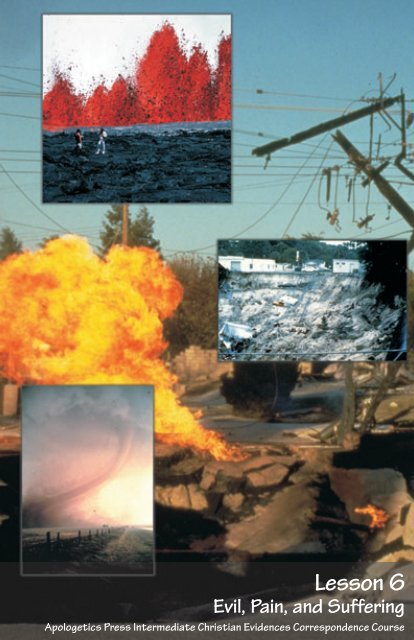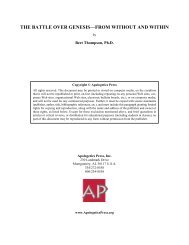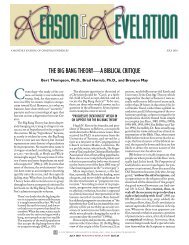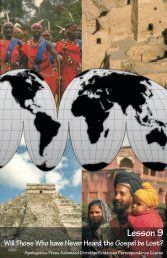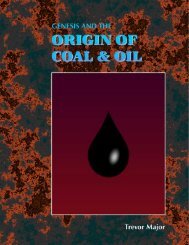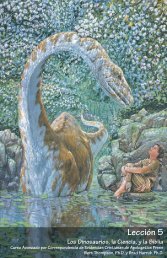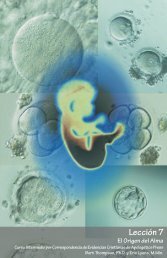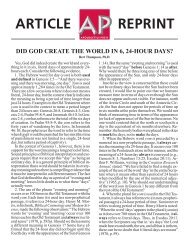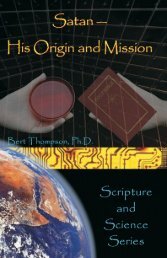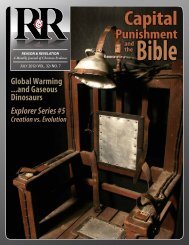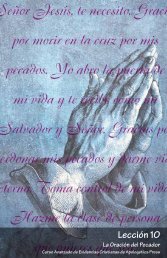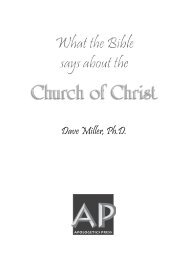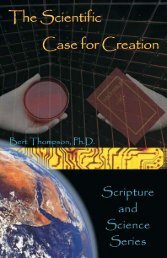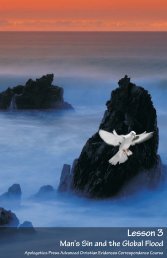Evil, Pain, and Suffering - Apologetics Press
Evil, Pain, and Suffering - Apologetics Press
Evil, Pain, and Suffering - Apologetics Press
Create successful ePaper yourself
Turn your PDF publications into a flip-book with our unique Google optimized e-Paper software.
Lesson 6<br />
<strong>Evil</strong>, <strong>Pain</strong>, <strong>and</strong> <strong>Suffering</strong><br />
<strong>Apologetics</strong> <strong>Press</strong> Intermediate Christian Evidences Correspondence Course
EVIL, PAIN, AND SUFFERING<br />
Many through the ages have ab<strong>and</strong>oned their belief in God because<br />
of the presence of evil, pain, <strong>and</strong> suffering in their lives or in the lives<br />
of those close to them. In 1851, Charles Darwin’s life set him irreversibly on<br />
the road to unbelief when his oldest daughter, Annie, fell ill. On April 23 of<br />
that year, she died at the tender age of ten. Darwin was devastated. Although<br />
his wife was a devout believer in God <strong>and</strong> Christianity, with Annie’s death<br />
Darwin no longer could stomach such concepts. Samuel Langhorne Clemens<br />
(a.k.a. Mark Twain) became embittered against God after the death, in 1896,<br />
of his favorite daughter, Suzy.<br />
In the mid-1960s, a devoutly religious young man from Chattanooga, Tennessee<br />
was a role model for all of his classmates. He led a prayer group, <strong>and</strong><br />
planned to become a foreign missionary—until his sister died of leukemia<br />
<strong>and</strong> his father committed suicide. The boy’s belief in God collapsed, <strong>and</strong> he<br />
subsequently became one of America’s most outspoken unbelievers, humanists,<br />
<strong>and</strong> pro-abortion advocates. That boy’s name?—Ted Turner, founder<br />
of world-famous CNN, the Turner Broadcasting System, <strong>and</strong> other well-known<br />
media enterprises.<br />
But, of course, it is not just the famous who ab<strong>and</strong>on their belief in God<br />
because of evil, pain, <strong>and</strong> suffering in their lives. The “man (or woman, as<br />
the case may be) on the street” is no less affected. Nearly everywhere one<br />
goes, questions arise: “If there is a God, why am I afflicted with this illness?”<br />
or “How could a benevolent God allow my son to be killed in a tornado?”<br />
These <strong>and</strong> hundreds of other questions have pierced the ears of listeners for<br />
millennia. How do theists reconcile the existence of suffering with the existence<br />
of an omnipotent <strong>and</strong> all-loving God? Is unbelief in God justified?<br />
Even though man cannot explain in specific detail every instance of human<br />
suffering, contrary to what many believe, there are several logical reasons<br />
why people experience mental <strong>and</strong> physical pain. One of the foremost<br />
reasons is rooted in the fact that God is love (1 John 4:8), <strong>and</strong> His love allows<br />
freedom of choice. God did not create men <strong>and</strong> women as robots to<br />
serve Him slavishly without any kind of free moral agency on their part (cf.<br />
Genesis 2:16-17; Joshua 24:15; John 5:39-40). God does not control His<br />
creation as a puppeteer controls a doll. Rather, as an expression of His love,<br />
He has granted mankind free will, <strong>and</strong> that free will enables human beings<br />
to make their own choices.<br />
1
Man frequently brings suffering upon himself because of the wrong decisions<br />
he makes. The apostle Peter wrote: “But let none of you suffer as a<br />
murderer, a thief, an evildoer, or as a busybody in other people’s matters”<br />
(1 Peter 4:15). When people suffer the consequences of their own wrong<br />
choices, they have no one to blame but themselves. If a person decides to kill<br />
someone, he very likely will suffer the unpleasant consequences of having<br />
made a terribly wrong choice. He may spend the rest of his life in prison, or<br />
perhaps be put to death himself. If a fornicator is found to have a sexually<br />
transmitted disease, it may be because she made the wrong decision to engage<br />
in illicit sex with someone who was infected. Thus, frequently mankind’s<br />
suffering results from a misuse or abuse of personal freedom.<br />
On occasion, man also suffers because of the personal wrong choices of<br />
others. If God allows one person freedom of choice, then, to be consistent<br />
in His love for the world (John 3:16; 1 John 4:8), He must allow everyone<br />
that same freedom. God is no respecter of persons (cf. Acts 10:34; Romans<br />
2:11). In 2 Samuel 11, we read where Uriah the Hittite suffered because of<br />
King David’s sins. Uriah ultimately lost his life because of David’s attempt<br />
to hide the sinful decisions he had made. Today, families may be affected adversely<br />
because a father is sent to prison on a drunk driving charge, or because<br />
a mother uses drugs. In each case, a single individual is the cause of an<br />
entire family’s suffering. If a man chooses to smoke cigarettes <strong>and</strong> then eventually<br />
dies of lung cancer, his family suffers because of his bad decision. But<br />
God hardly is to blame.<br />
Another reason for the suffering that humans endure (<strong>and</strong> one that is closely<br />
related to the first two) has to do with the personal wrong choices of former<br />
generations. For example, why are hordes of people starving to death in various<br />
Third World countries today? While that admittedly is a difficult question<br />
with several possible answers, one partial answer has to do with the fact<br />
that these people’s ancestors, millennia ago, taught that it was wrong to eat<br />
certain animals because they might be eating one of their ancestors. The false<br />
doctrine of reincarnation, as this idea has come to be known, thus has deprived<br />
millions throughout the world of their health. Is God to blame when<br />
people will not eat the food He has provided—food that could provide them<br />
with proper nourishment? Again, the answer is “No.” There can be no doubt<br />
that many of the decisions of former generations have caused much pain <strong>and</strong><br />
suffering for those living in the world today.<br />
Consider this, also. We frequently hear (or offer!) complaints about reaping<br />
evil from the wrong choices of generations long since gone, but we rarely<br />
hear expressions of gratitude for the many blessings that have been passed<br />
down to us as a result of the hard work <strong>and</strong> sacrifices of those same people.<br />
We live longer <strong>and</strong> healthier lives because of numerous medical discoveries,<br />
<strong>and</strong> we have technological conveniences that make our daily lives all<br />
2
the more pleasant. Truth be told, we eat of vineyards we did not plant; we<br />
drink of cisterns we did not dig. We owe much to many of the distant past.<br />
The fact is, while man often suffers because of the sins of former generations,<br />
he also benefits from their labors. If man truly is free, it must be possible<br />
for him to reap the benefits, as well as suffer the consequences, of his own<br />
decisions <strong>and</strong> the decisions of others.<br />
People also suffer because of violations of natural law. Fortunately, God<br />
created a world ruled by specific laws that He established at the Creation.<br />
Those laws were implemented for man’s own good, but if the laws are violated,<br />
then man will suffer the consequences. If a man steps off the roof of a<br />
five-story building, gravity will pull him to the pavement beneath. If a boy<br />
steps in front of a moving freight train, since two objects cannot occupy the<br />
same space at the same time, the train will strike the child <strong>and</strong> likely kill him.<br />
Why? Because he has (knowingly or unknowingly) violated the natural order<br />
of this world. The natural laws that God created allow man to produce<br />
fire. But the same laws that enable him to cook his food also allow him to<br />
destroy entire forests. Laws that make it possible to have things constructive<br />
to human life also introduce the possibility that things destructive to<br />
human life may occur. How can it be otherwise? A moving car is matter in<br />
motion, <strong>and</strong> takes us where we wish to go. But if someone steps in front of<br />
that car, the same natural laws that operated to our benefit will similarly operate<br />
to our detriment. The same laws that govern gravity, matter in motion,<br />
or similar phenomena also govern weather patterns, water movement, <strong>and</strong><br />
other geological/meteorological conditions. All of nature is regulated by<br />
these laws—not just the parts that we find convenient. If God suspended natural<br />
laws every time one of His creatures was in a dangerous or life-threatening<br />
situation, chaos would corrupt the Cosmos, <strong>and</strong> would argue more for a<br />
world of atheism than a world of theism!<br />
Everyone (believer <strong>and</strong> unbeliever alike) must obey the natural laws that<br />
God established, or else suffer the consequences. In Luke 13:2-5, Jesus told<br />
the story of eighteen men who died when the tower of Siloam collapsed on<br />
them. Had these men perished because of their sins? No, they were no worse<br />
sinners than their peers. They died because a natural law was in force. Fortunately,<br />
natural laws work continually so that we can underst<strong>and</strong> <strong>and</strong> benefit<br />
from them. We are not left to sort out some kind of haphazard system that<br />
works one day but not the next.<br />
Throughout history, man has experienced great tragedies. In A.D. 526,<br />
an earthquake hit the country now known as Turkey, <strong>and</strong> left over 250,000<br />
dead in its aftermath. A similar earthquake in China in 1556 killed more than<br />
830,000 people. On September 21, 1989, Hurricane Hugo struck the south-<br />
3
eastern coast of the United States, killing over 25 people <strong>and</strong> causing an<br />
estimated $10 billion worth of damage. One month later (October 17, 1989),<br />
an earthquake registering 7.1 on the Richter scale struck the San Francisco<br />
Bay area in California. At least 62 people were killed, <strong>and</strong> damage estimates<br />
were placed at well over $1 billion.<br />
It is rare, it seems, for a single generation in a given locale to be spared at<br />
least some kind of natural disaster. Without warning, tornadoes sweep down<br />
from the afternoon sky <strong>and</strong> destroy in a moment’s fury what took decades<br />
or centuries to build. Floods cover “old home places” <strong>and</strong> remove forever<br />
any vestige of what were once storehouses of hallowed memories. In a matter<br />
of seconds, earthquakes irreparably alter once-familiar l<strong>and</strong>scapes. Hurricanes<br />
come from the sea, demolish practically everything in their paths, <strong>and</strong><br />
then dissipate as if they never had existed. Each time, humanity suffers. And<br />
each time there are those who ask “Why?” Why does the Earth experience<br />
natural disasters in the first place, <strong>and</strong> why are such disasters not incompatible<br />
with a benevolent God?<br />
At the end of His six days of creation (Genesis 1:31), God surveyed all<br />
that He had made <strong>and</strong> proclaimed it “very good”—Hebrew terminology<br />
representing that which was both complete <strong>and</strong> perfect. Rivers were running,<br />
fish were swimming, <strong>and</strong> birds were flying. Pestilence, disease, <strong>and</strong> human<br />
death were unknown. Man existed in a serene paradise of happiness <strong>and</strong><br />
beauty where he shared such an intimate <strong>and</strong> blissful covenant relationship<br />
with his Maker that God came to the Garden of Eden “in the cool of the day”<br />
to commune with its human inhabitants (Genesis 3:8). Additionally, Genesis<br />
3:22 records that man had continual access to the tree of life that stood<br />
in the garden, the fruit of which would allow him to live forever.<br />
The peacefulness <strong>and</strong> tranquility of the first days of humanity were not<br />
to prevail, however. In Genesis 3—in fewer words than an average sportswriter<br />
would use to discuss a Friday night high school football game—Moses,<br />
through inspiration, discussed the breaking of the covenant relationship between<br />
man <strong>and</strong> God, the entrance of sin into the world, <strong>and</strong> the curse(s) that<br />
resulted therefrom. When our original parents revolted against their Creator,<br />
evil entered the world. Moses informs us that as a direct consequence of human<br />
sin, the Earth was “cursed” (Genesis 3:17). Paul, in Romans 8:20-21,<br />
declared that the entire creation was subjected to “futility” <strong>and</strong> the “bondage<br />
of corruption” as a result of the sinful events that took place in Eden on<br />
that occasion. Things apparently deteriorated rapidly. Just three chapters<br />
later, Moses wrote of the saturated wickedness of man (Genesis 6:5-7).<br />
4
Genesis 6-8 records the global destruction resulting from the Great Flood<br />
sent by God as His instrument of judgment. The text indicates that the waters<br />
that caused the Flood originated from two distinct sources: (a) “the fountains<br />
of the great deep”; <strong>and</strong> (b) “the windows of heaven” (Genesis 7:11). Water<br />
fell for forty days <strong>and</strong> nights (Genesis 7:12,17), <strong>and</strong> eventually covered “all<br />
the high hills under the whole heaven” (Genesis 7:19). We may only surmise<br />
the changes that the Flood wrought upon the Earth. Local floods can cause<br />
tremendous damage in very brief periods. Imagine, then, the damage that<br />
the waters of the Flood must have caused as they covered every mountain<br />
to a height of fifteen cubits (Genesis 7:20; approximately 22½ feet). As one<br />
writer has suggested:<br />
The destructive power of flood-waters is evident from what flood waters<br />
in recent years have done. They moved blocks of granite weighing<br />
350 tons more than a hundred yards. Boulders weighing 75 to 210<br />
tons have been moved by flood waters only 15 to 20 feet deep.... What<br />
vast devastation must have been created when all those forces of the<br />
earth worked together; rain gushing down from the canopy above the<br />
firmament, earthquakes shaking the earth, many volcanoes erupting<br />
<strong>and</strong> exploding at one time, continents shifting, mountains lifting up,<br />
tornados, hurricanes <strong>and</strong> wild windstorms raging, gigantic tidal waves<br />
with crosscurrents <strong>and</strong> whirlpools raising havoc.... Truly, the Flood was<br />
the greatest <strong>and</strong> most violent catastrophe in the history of the world,<br />
with total destruction of all forms of life <strong>and</strong> of the entire surface of the<br />
earth (Sippert, 1989, pp. 78-79).<br />
What were conditions like on the Earth prior to the Great Flood? Numerous<br />
scientific <strong>and</strong> biblical scholars have suggested that conditions were radically<br />
different than those we see today, <strong>and</strong> that the Earth was devoid of the<br />
many natural disasters that it presently experiences. In their classic text, The<br />
Genesis Flood, John C. Whitcomb <strong>and</strong> Henry M. Morris stated:<br />
This is inferred from the fact that the “breaking-up of the fountains of<br />
the great deep” (Genesis 7:11), which implies this sort of activity, was<br />
one of the immediate causes of the Deluge; therefore it must have been<br />
restrained previously.... Thus the Biblical record implies that the age between<br />
the fall of man <strong>and</strong> the resultant Deluge was one of comparative<br />
quiescence geologically. The waters both above <strong>and</strong> below the firmament<br />
were in large measure restrained, temperatures were equably warm,<br />
there were no heavy rains nor winds <strong>and</strong> probably no earthquakes nor<br />
volcanic emissions (1961, pp. 242,243).<br />
It is not unreasonable to suggest, knowing the changes caused by local<br />
floods, that the global Flood of Genesis 6-8 not only radically altered the<br />
face of the Earth, but simultaneously produced circumstances that are responsible<br />
for the many natural disasters experienced since that time. New,<br />
higher mountains <strong>and</strong> lower valleys were produced by God after the Flood<br />
5
(Psalm 104:6-10). Approximately 71.9% of the Earth’s surface remained<br />
covered with water. Temperature changes occurred, producing seasonal variations<br />
unlike any before. No doubt other factors were involved as well.<br />
What causes natural disasters on the Earth today? One cause, of course,<br />
is the vastly different geological <strong>and</strong> meteorological phenomena now present<br />
on our planet. Tall mountains <strong>and</strong> deep valleys can be conducive to localized<br />
extremes in weather. The drastically changed components of the<br />
Earth’s crust (e.g., fault lines, etc.) give rise to earthquakes. Vast bodies of<br />
water, <strong>and</strong> large global climatic variations, spawn hurricanes <strong>and</strong> tropical<br />
storms. In his second epistle, the apostle Peter referred to “the world that<br />
then was” <strong>and</strong> its destruction by the Flood (3:6). That world no longer exists.<br />
Today we inhabit a once-perfect-but-now-flawed Earth.<br />
But, some will ask, why can’t God “selectively intervene” to prevent disasters?<br />
Bruce Reichenbach has addressed this question:<br />
...[I]n a world which operates according to divine miraculous intervention,<br />
there would be no necessary relation between phenomena, <strong>and</strong><br />
in particular between cause <strong>and</strong> effect. In some instances one event<br />
would follow from a certain set of conditions, another time a different<br />
event, <strong>and</strong> so on, such that ultimately an uncountable variety of events<br />
would follow a given set of conditions. There would be no regularity of<br />
consequence, no natural production of effects.... Hence, we could not<br />
know or even suppose what course of action to take to accomplish a<br />
certain rationally conceived goal. Thus, we could neither propose action<br />
nor act ourselves (1976, p. 187).<br />
How, exactly, could a livable, dependable world—governed by appropriate<br />
<strong>and</strong> underst<strong>and</strong>able laws—be created <strong>and</strong> operated, other than the way ours<br />
presently is? And how, in such a world, could disasters be prevented, while maintaining<br />
both natural law <strong>and</strong> human freedom?<br />
Taken at face value, the wickedness of mankind in Noah’s day, which<br />
precipitated the Flood, is responsible ultimately for the changes that now<br />
produce various natural disasters. Upon whom should we heap blame for<br />
the suffering resultant from such weather? Is it fair to accuse God, when He<br />
initially created man’s home free from such things (Genesis 1:31)? In all<br />
honesty, the answer has to be no. Sin robbed us of our original garden paradise,<br />
<strong>and</strong> sin was responsible for the global deluge (Genesis 3:24; 6:7).<br />
Again, God is not to blame.<br />
Instead of blaming God when tragedies such as natural disasters strike,<br />
we need to turn to Him for strength <strong>and</strong> let tragedies, of whatever nature,<br />
remind us that this world never was intended to be our final home (Hebrews<br />
11:13-16). Our time here is temporary (James 4:14), <strong>and</strong> with God’s help,<br />
we can triumph over whatever comes our way (Romans 8:35-39; Psalm 46:<br />
6
1-3). In the end, the most important question is not “Why did this happen<br />
to me?,” but rather “How can I underst<strong>and</strong> what has happened, <strong>and</strong> how<br />
am I going to react to it?” With Peter, the faithful Christian can echo the sentiment<br />
that God, “who called us to His eternal glory by Christ Jesus, after you<br />
have suffered a while, perfect, establish, strengthen, <strong>and</strong> settle you. To Him<br />
be the glory <strong>and</strong> the dominion forever <strong>and</strong> ever” (1 Peter 5:10-11).<br />
Remember, too, that there are times when suffering is beneficial. Think<br />
of the man whose chest begins to throb as he enters the throes of a heart attack.<br />
Think of the woman whose side begins to ache at the onset of acute<br />
appendicitis. Is it not true that pain often sends us to the doctor for prevention<br />
or cure? Is it not true also that at times suffering helps humankind develop<br />
the traits that people treasure the most? Bravery, heroism, altruistic<br />
love, self-sacrifice—all flourish in less-than-perfect environments, do they not?<br />
Finally, no one can suggest—justifiably—that suffering per se is contrary<br />
to the existence or goodness of God, in light of the series of events that transpired<br />
at Calvary almost two thous<strong>and</strong> years ago. The fact that even Jesus<br />
as the Son of God was subjected to evil, pain, <strong>and</strong> suffering (Hebrews 5:<br />
8; 1 Peter 2:21ff.) proves that God loves <strong>and</strong> cares for His creation. He is not<br />
the unloving, angry, vengeful God depicted by atheism <strong>and</strong> infidelity. Rather,<br />
“when we were enemies we were reconciled to God through the death of<br />
His Son, much more, having been reconciled, we shall be saved by His life”<br />
(Romans 5:10). God could have ab<strong>and</strong>oned us to our own sinful devices but<br />
instead, “God demonstrates His own love toward us, in that while we were<br />
still sinners, Christ died for us” (Romans 5:8; 1 John 4:9-10).<br />
The unbeliever, for reasons known only to himself, either is unable, or<br />
unwilling, to concede the love of God. That—not the evil, pain, or suffering<br />
that he currently endures—is the greatest tragedy of his life.<br />
Reichenbach, Bruce (1976), “Natural <strong>Evil</strong>s <strong>and</strong> Natural Laws,” International<br />
Philosophical Quarterly, Vol. 16.<br />
Sippert, Albert (1989), From Eternity to Eternity (North Mankato, MN: Sippert<br />
Publishing).<br />
Whitcomb, John C. <strong>and</strong> Henry M. Morris (1961), The Genesis Flood (Gr<strong>and</strong><br />
Rapids, MI: Baker).<br />
Published by <strong>Apologetics</strong> <strong>Press</strong>, Inc. Additional copies may be ordered<br />
from our offices at: 230 L<strong>and</strong>mark Drive, Montgomery, Alabama<br />
36117, USA, 334/272-8558. If you wish to have the test<br />
portion of the lesson graded, return it to the church or individual<br />
who provided you with the lesson. Returning it to <strong>Apologetics</strong> <strong>Press</strong><br />
will result in your receiving a delayed response. Copyright © 2001<br />
www.<strong>Apologetics</strong><strong>Press</strong>.org
Questions—Lesson 6<br />
DIRECTIONS: Write TRUE or FALSE in the blanks before the<br />
following statements.<br />
__________ 1. Very few have ab<strong>and</strong>oned their belief in God because<br />
of the presence of evil, pain, <strong>and</strong> suffering.<br />
__________ 2. Man can explain in specific detail every instance<br />
of human suffering.<br />
__________ 3. Because God is loving, He gives man freedom of<br />
choice.<br />
__________ 4. The doctrine of reincarnation has deprived millions<br />
of people throughout the world of good<br />
health.<br />
__________ 5. Man frequently brings suffering upon himself because<br />
of the wrong decisions he makes.<br />
__________ 6. There are several logical reasons why people experience<br />
mental <strong>and</strong> physical pain.<br />
__________ 7. Only the famous ab<strong>and</strong>on their belief in God because<br />
of evil, pain, <strong>and</strong> suffering.<br />
__________ 8. As the Son of God, Jesus never was subjected to<br />
evil, pain, <strong>and</strong> suffering.<br />
Circle the correct answer(s).<br />
1. In 1851, this man’s spiritual life changed for the worse after his<br />
daughter, Annie, fell ill <strong>and</strong> died.<br />
(a) Abraham Lincoln (b) Charles Darwin<br />
(c) Mark Twain<br />
(d) Ted Turner
2. The Flood described in Genesis 6-8 was :<br />
(a) A local flood<br />
(c) Very destructive<br />
(b) Not very severe<br />
(d) Not a result of sin<br />
3. Uriah the Hittite suffered because of the sins of:<br />
(a) Solomon (b) Saul (c) Abraham (d) David<br />
4. God created a world ruled by which of the following?<br />
(a) Law <strong>and</strong> order<br />
(c) Chaos<br />
(b) Chance<br />
(d) Disorder<br />
5. How long did water fall from heaven during the Flood?<br />
(a) 40 days <strong>and</strong> 40 nights<br />
(c) 24 hours<br />
(b) 365 days <strong>and</strong> nights<br />
(d) 14 days <strong>and</strong> nights<br />
Match the ideas on the left with the terms on the right (place the<br />
correct letter in the space provided by each number).<br />
1. ____ This man became an<br />
atheist after his sister<br />
died of leukemia <strong>and</strong><br />
his father committed<br />
suicide<br />
2. ____ Covered the tallest<br />
mountains by 15 cubits<br />
3. ____ Sometimes suffering<br />
can be<br />
4. ____ He suffered <strong>and</strong> died<br />
to save us from our sins<br />
5. ____ One of the sources of<br />
the Flood water<br />
6. ____ Became embittered<br />
against God in 1896<br />
after the death of his<br />
favorite daughter, Suzy<br />
A. Beneficial<br />
B. Jesus<br />
C. Fountains of the great deep<br />
D. Global Flood<br />
E. Ted Turner<br />
F. Mark Twain
1. God did not create men <strong>and</strong> women as ____________ to serve<br />
Him slavishly without any kind of _________ moral agency on<br />
their part.<br />
2. If God allows _____ person freedom of choice, He must allow<br />
_______ that freedom to be consistent in his love for the world.<br />
3. _______ _____ were implemented in the beginning for man’s<br />
own good, but if these laws are violated, then man will suffer<br />
the _______________.<br />
4. The fact that even ________ as the Son of God was subjected<br />
to evil, pain, <strong>and</strong> ______________ proves that God loves <strong>and</strong><br />
cares for His ______________.<br />
5. “But let none of you _________ as a murderer, a thief, an evildoer,<br />
or as a busybody in other people’s matters...” (1 Peter 4:<br />
15).<br />
6. In his second epistle, Peter referred to “the ________ that then<br />
______,” <strong>and</strong> its destruction by the ___________ (3:6).<br />
NAME _____________________________________________<br />
ADDRESS _________________________________________<br />
____________________________________________________<br />
CITY __________________________ STATE ____________<br />
POSTAL CODE ________________ DATE ______________<br />
Copyright © 2001—<strong>Apologetics</strong> <strong>Press</strong>, Inc.


